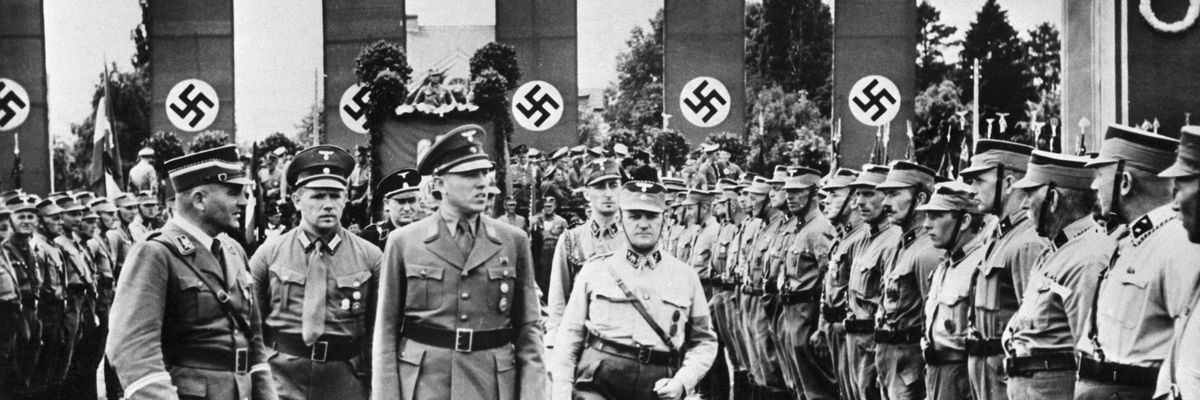
Protesters from climate protest group 'Just Stop Oil' are arrested by police officers close to where Britain's King Charles III and Britain's Camilla, Queen Consort were crowned at Westminster Abbey in central London on May 6, 2023.
(Photo by JUSTIN TALLIS/POOL/AFP via Getty Images)
COMMON DREAMS STAFF
May 06, 2023
Thousands of King Charles III's subjects protested against the monarchy Saturday in London — and heavy-handed police detained many of them for "suspicion of breaching the peace."
Earlier this week, the Metropolitan Police tweeted that they would have an “extremely low tolerance” of those seeking to “undermine” King Charles III's coronation day.
“A significant police operation is underway in central London,” the Metropolitan Police said in a statement Saturday. “The individuals have been held on suspicion of breaching the peace.”
At around 7 a.m. police stopped six of the anti-monarchy group Republic’s organizers and told them they were detaining and searching them, Republic director Harry Stratton told CNN at the protest. The group had been walking behind a rental van containing hundreds of placards. “They didn’t say why they were arresting them. They didn’t tell them or us where they were taking them. It really is like something out of a police state,” Stratton said.
Among those arrested ahead of a protest in London’s Trafalgar Square was Graham Smith, chief executive of Republic.
“This morning, Graham Smith and five members of our team were arrested. Hundreds of placards were seized,” Republic tweeted. “Is this democracy?”
Protesters say police warned them not to chant ‘anything that may be deemed offensive.’
The Metropolitan Police said those arrested were being “held on suspicion of conspiracy to cause public nuisance.”
Just Stop Oil reported that around 20 of its climate demonstrators had been arrested, with photos showing a man wearing a T-shirt with the group’s name being detained in Whitehall. “He was arrested along with 20 others,” Just Stop Oil tweeted. “Free speech is a core British value – and we have just lost it. No supporters of Just Stop Oil arrested in the crowd had glue, paint or any plans to disrupt the coronation. We are living in a dystopian nightmare.”
Human Rights Watch's UK director Yasmine Ahmed said in a statement: "The reports of people being arrested for peacefully protesting the coronation are incredibly alarming. This is something you would expect to see in Moscow not London.
"Peaceful protests allow individuals to hold those in power to account, something the UK government seems increasingly averse to.”
Sacha Deshmukh, Amnesty International UK’s chief executive, said: “We need to see what details emerge around these incidents but merely being in possession of a megaphone or carrying placards should never be grounds for a police arrest.
“Peaceful protest is clearly protected under international human rights law and it’s been worrying to see the police this week making numerous statements about their ‘low tolerance’ for disruption at the coronation. The coronation shouldn’t become yet another excuse for undermining people’s basic human rights in this country and we’re awaiting more details over these concerning reports of arrests.”
“We’ve recently had the introduction of extremely draconian legislation outlawing ‘disruptive’ or ‘noisy’ protests, which has given the police excessive – and highly subjective – powers and seriously damaged people’s right of free speech and public assembly.
“The coronation shouldn’t become yet another excuse for undermining people’s basic human rights in this country.”
Our work is licensed under Creative Commons (CC BY-NC-ND 3.0).
By Christian Edwards, Lindsay Isaac and Allegra Goodwin, CNN
Sat May 6, 2023
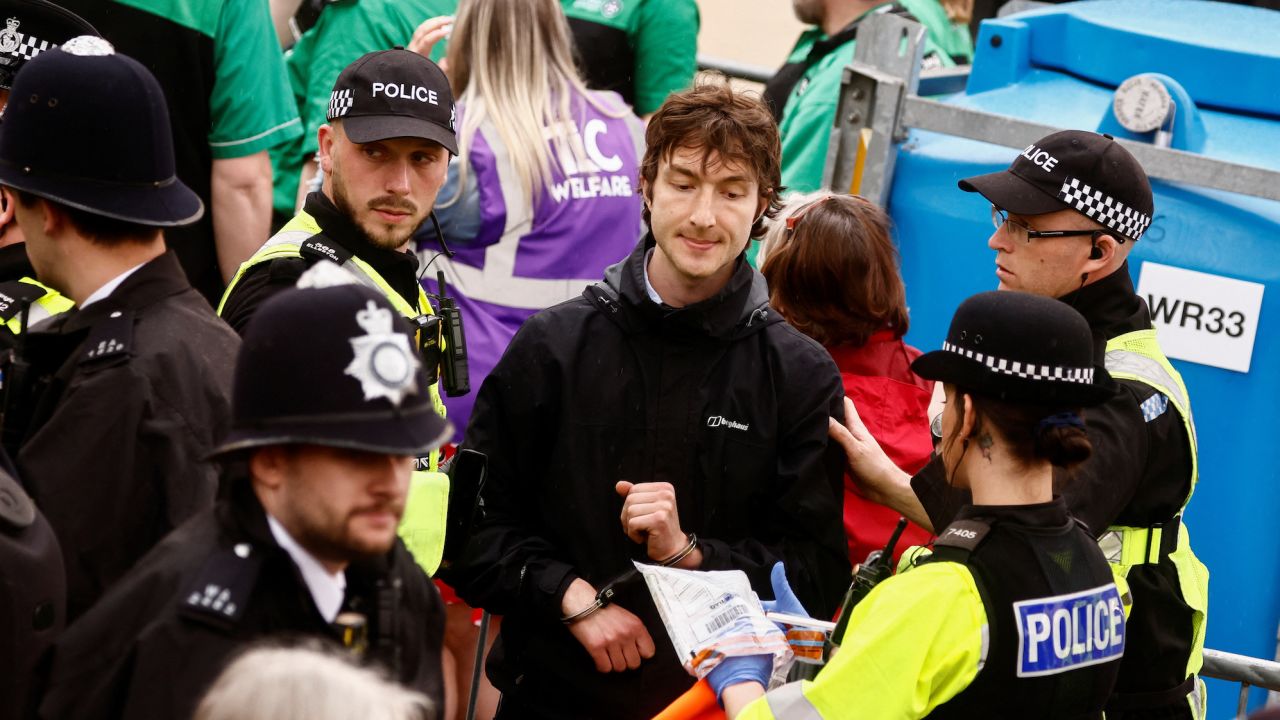
The Metropolitan Police said "a number of arrests" were made Saturday morning.Yara Nardi/Pool/Reuters
LondonCNN —
Several anti-monarchy protesters were arrested in central London ahead of the coronation of King Charles III on Saturday, their group has said, as the Metropolitan Police force faces scrutiny for its approach toward demonstrators at the historic event.
Thousands gathered in central London on Saturday to celebrate the once-in-a-generation event. But it also drew demonstrators, with protesters wearing yellow T-shirts booing and shouting “Not My King” throughout the morning.
Republic, Britain’s largest anti-monarchy group, told CNN that police – without providing any reason – arrested organizers of the anti-monarchy protest.
At around 7 a.m. (2 a.m. ET) police stopped six of Republic’s organizers and told them they were detaining and searching them, Republic director Harry Stratton told CNN at the protest.
Graham Smith, the chief executive of Republic, was among those detained, according to a video shared by the Alliance of European Republican Movements.
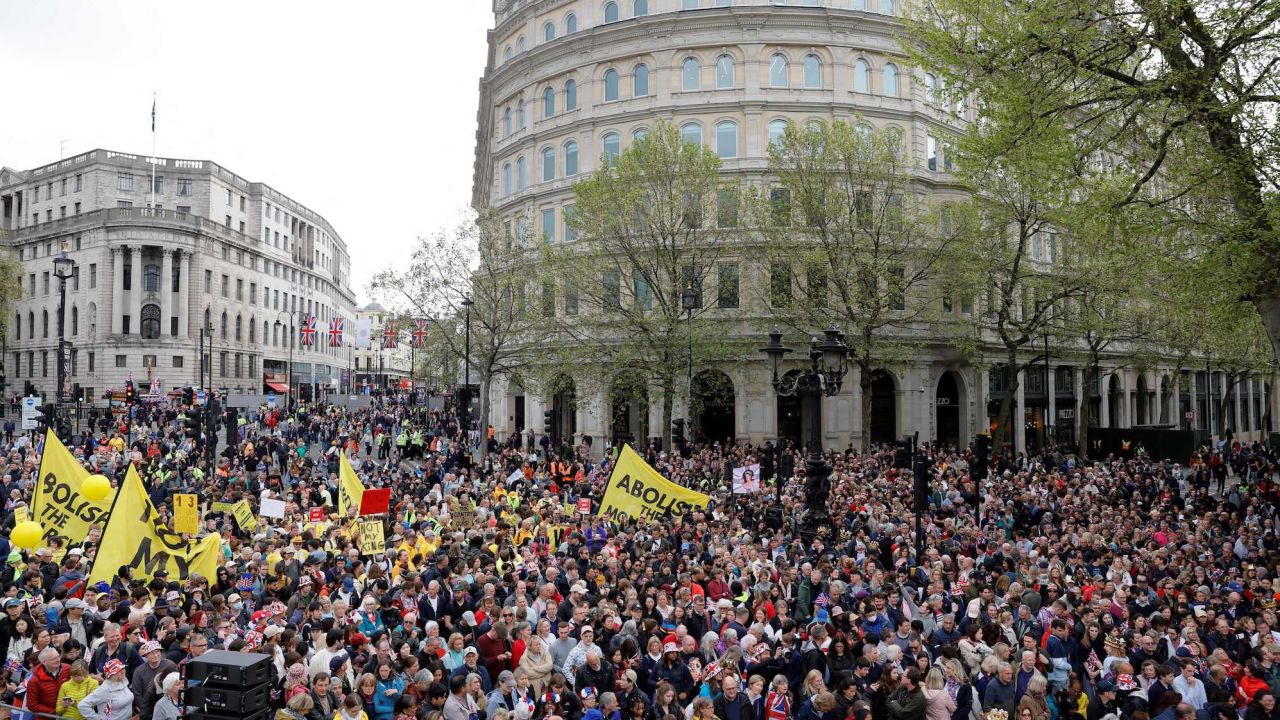
Protesters hold signs reading "Not My King" and "Abolish the Monarchy" close to the procession.Piroschka Van De Wouw/Pool/AFP/Getty Images
Stratton said that when the organizers asked police why they were being detained, they were told officers “would figure it out” after they had searched the anti-monarchy protesters. After searching them, police told the six organizers they were arresting and seizing hundreds of their placards carrying the slogan “Not My King.”
“They didn’t say why they were arresting them. They didn’t tell them or us where they were taking them. It really is like something out of a police state,” Stratton said.
“I think people are quite perturbed by the police reaction. But the crowd reaction to us has been overwhelmingly friendly,” he added.
The group posted on Twitter Saturday, commenting: “So much for the right to peaceful protest.”
Members of environmental activist group Just Stop Oil also appeared to have been arrested on The Mall outside Buckingham Palace, the UK’s PA Media news agency reported, adding that a large group of the protesters were seen in handcuffs.
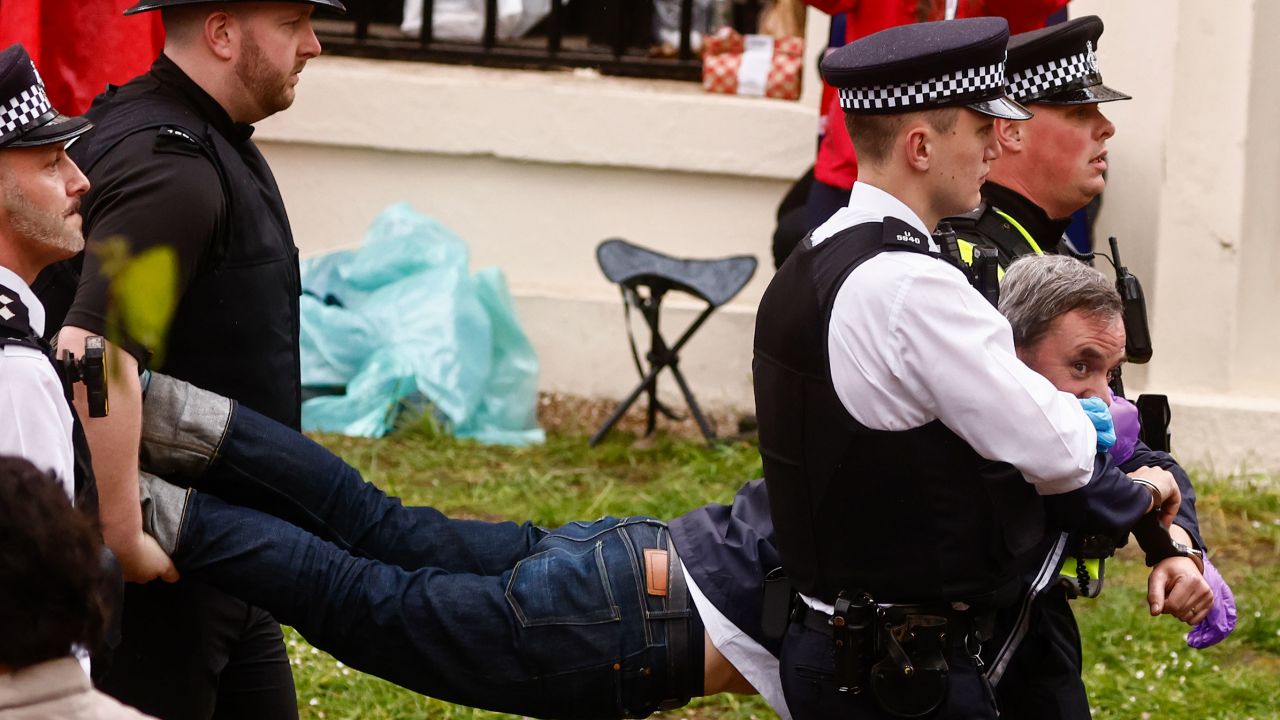
A Just Stop Oil member was arrested and carried away by police.Yara Nardi/WPA Pool/Getty Images
The Metropolitan Police confirmed several arrests had been made in central London.
“Earlier today we arrested four people in the area of St Martin’s Lane. They were held on suspicion of conspiracy to cause public nuisance,” the force tweeted.
“We have made a number of arrests in the area of Carlton House Terrace. The individuals have been held on suspicion of breaching the peace,” the Met continued. “A further three people were arrested in the area of Wellington Arch. They were held on suspicion of possessing articles to cause criminal damage.”
Human Rights Watch, a non-profit campaign group, said the coronation arrests were “something you would expect to see in Moscow not London,” according to a statement obtained by PA Media..
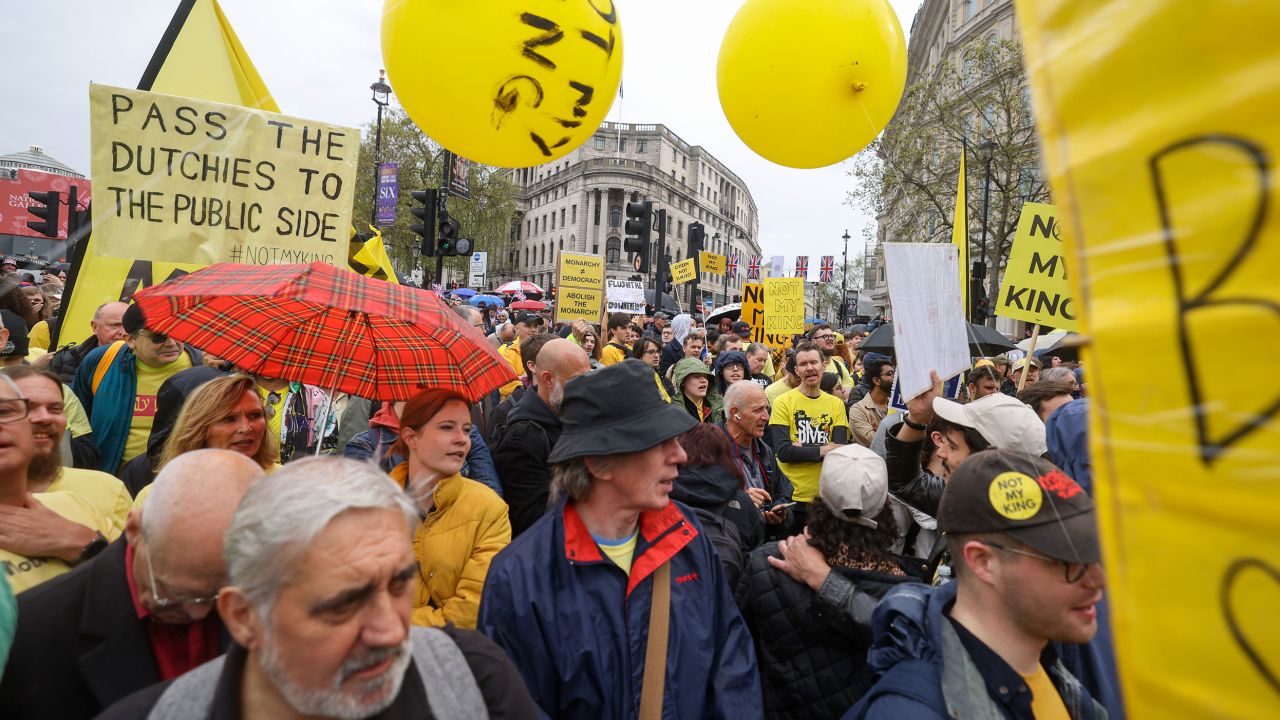
Anti-monarchy groups have expressed concern over the treatment of protesters.Chris Ratcliff/Bloomberg/Getty Images
Republic claimed it was expecting between 1,500 and 2,000 people to join the group at its protest in Trafalgar Square, just south of the royal procession route.
“Instead of a coronation we want an election. Instead of Charles we want a choice. It’s that simple,” the group tweeted on Saturday.
Growing police powers
The Metropolitan Police, the UK’s largest police force, has been scrutinized for its tough approach toward protests around the coronation.
“Our tolerance for any disruption, whether through protest or otherwise, will be low,” the force wrote on Twitter this week. “We will deal robustly with anyone intent on undermining this celebration.”
Ahead of the event, the Met said that morpe than 11,500 police officers would be deployed in London on Saturday, making the coronation the largest one-day deployment in decades.
The operation – labeled Golden Orb – saw officers line the processional route, manage crowds and road closures, protect high-profile individuals and carry out searches with specialist teams.
There are also plans for facial recognition technology to be used in central London, which has sparked criticism from human rights groups.
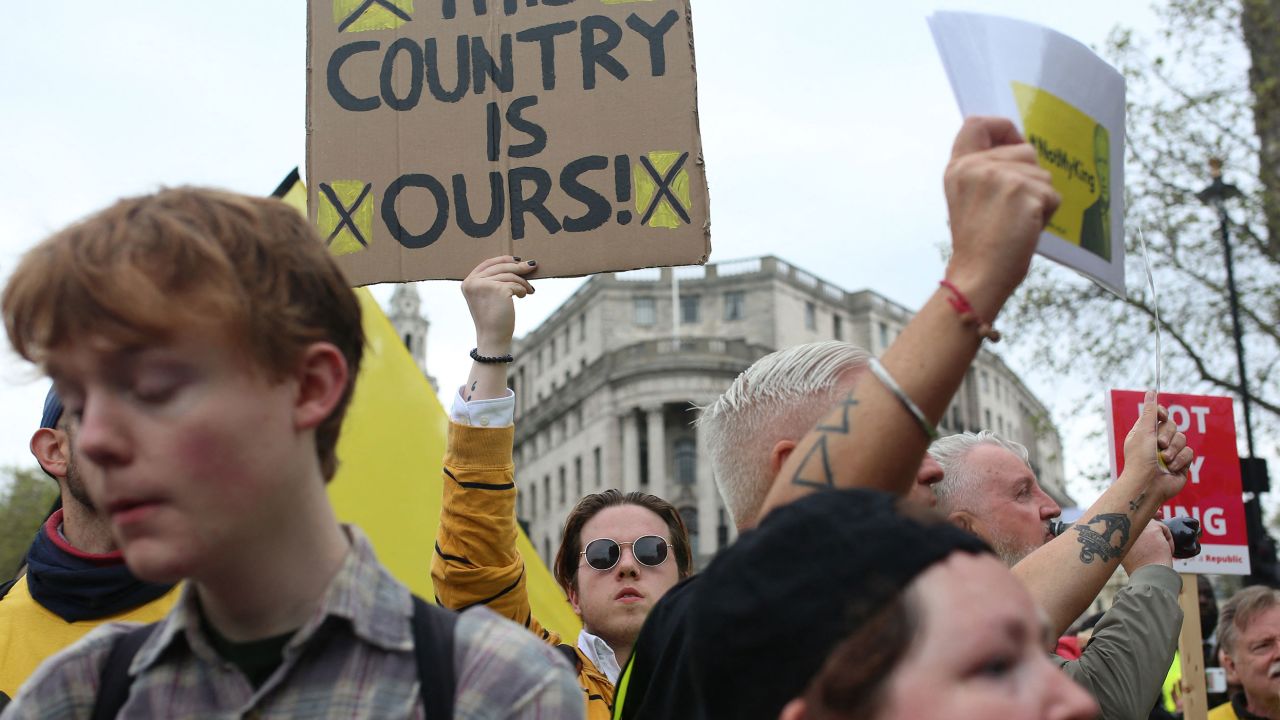
Demonstrators gathered in central London on Saturday.Susannah Ireland/AFP/Getty Images
“We all have the right to go about our lives without being watched and monitored, but everyone at the coronation is at risk of having their faces scanned by oppressive facial recognition technology,” Emmanuelle Andrews of human rights group Liberty, said on Twitter.
The operation comes amid growing concern over the increase in the police’s power to stifle dissent in Britain, following the recent introduction of controversial pieces of legislation.
Last year, the Police, Crime, Sentencing and Courts Act 2022 significantly “broaden[ed] the range of circumstances in which police may impose conditions on a protest.” Under the new Act, it is an offense for protesters to “intentionally or recklessly caus[e] public nuisance” – including causing “serious annoyance.”
In a statement to CNN, Liberty said this Act “has made it much harder for people to stand up for what they believe without facing the risk of criminalization.”
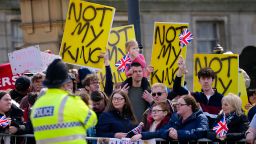
Parts of a controversial anti-protest law come into force ahead of King Charles' coronation
On Tuesday, a new law called the Public Order Act received royal assent from King Charles, which is a formality and the final hurdle before a bill becomes law.
It will “give police the powers to prevent disruption at major sporting and cultural events taking place this summer in England and Wales,” the UK Home Office said in a statement.
Specific measures in the Act were introduced from Wednesday.
Under this law, long-standing protest tactics such as locking on – where protesters physically attach themselves to things like buildings – could lead to a six-month prison sentence or “unlimited fine,” said the Home Office.
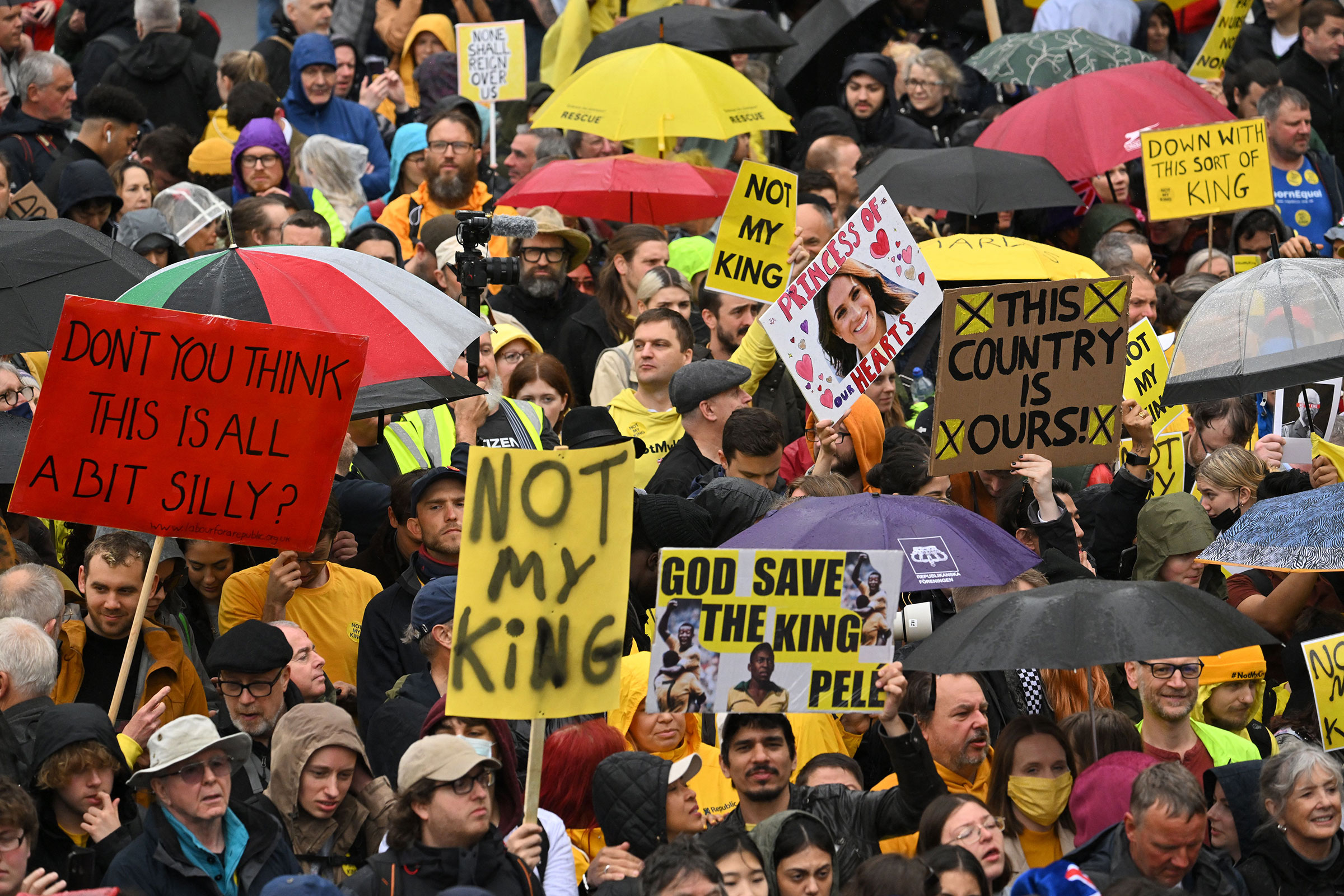
Members of the anti-monarchist group Republic stage a protest close to where Britain's King Charles III and Britain's Camilla, Queen Consort will be crowned at Westminster Abbey in central London, on May 6, 2023.
Sebastien Bozon—Pool/AFP/Getty Images
BY YASMEEN SERHAN / LONDON
UPDATED: MAY 6, 2023
Graham Smith, the head of the U.K.’s leading anti-monarchy movement, was planning to lead thousands of fellow republicans in protest of King Charles III’s coronation. In the end, he didn’t get the chance. Smith and five others were arrested on Saturday morning in Central London, according to the group.
The reason for the arrest remains unclear. At approximately 7:30 a.m. local time, Smith and his fellow protesters were collecting drinks and placards for attendees when, according to The Guardian, they were stopped by the police. A spokesperson for Republic told the newspaper that the police would not provide a reason for the arrest. In photos of the arrest posted to Twitter by the campaign group, Smith can be seen sitting on the ground surrounded by police officers. In a video, one officer can be heard saying: “They’re under arrest—end of.”
The Metropolitan Police, which has deployed 11,500 officers for the coronation, subsequently tweeted that they had made “a number of arrests” in the area, adding that “the individuals have been held on suspicion of breaching the peace.”
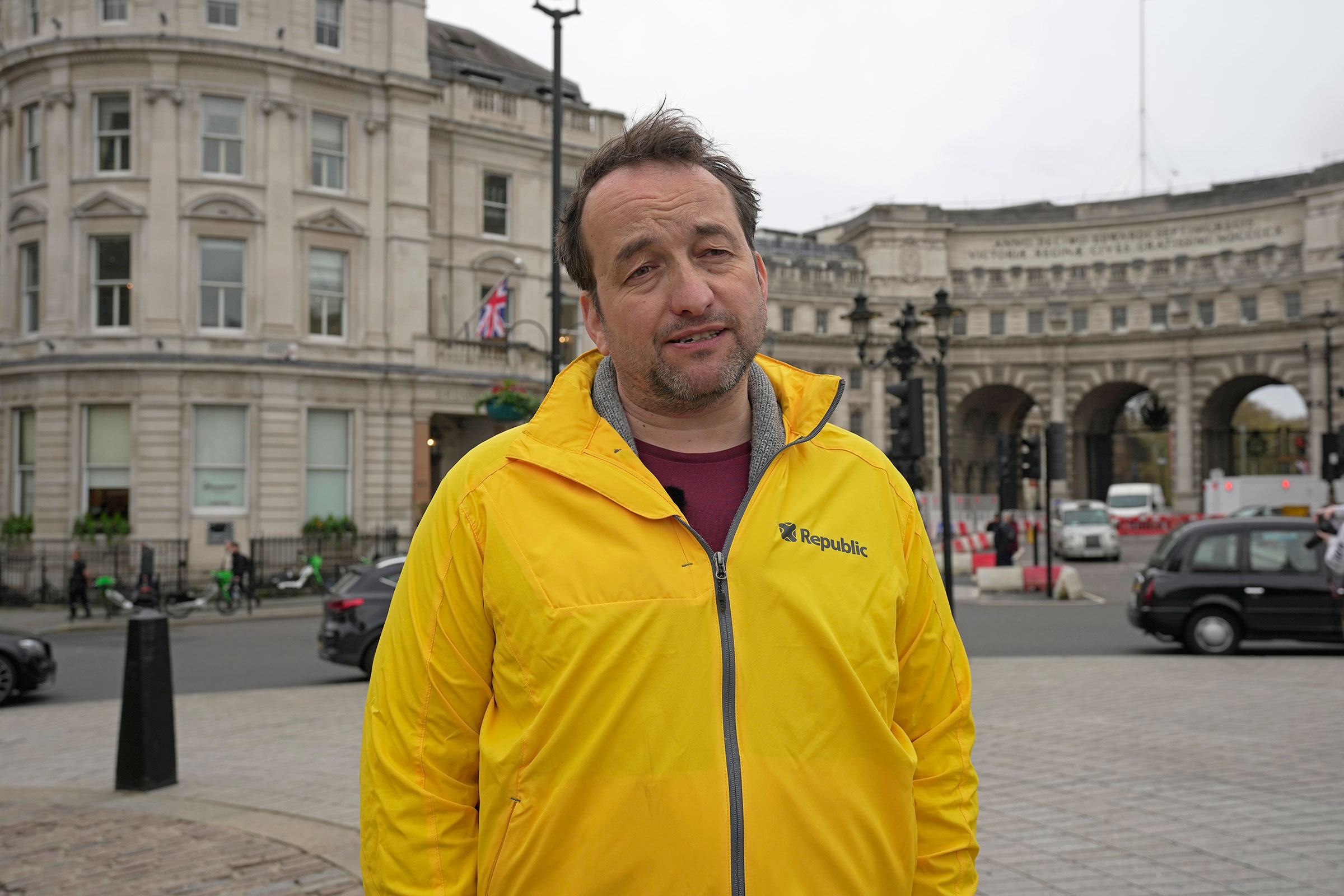
Graham Smith of the campaigning group Republic speaks during an interview in London, on April 27, 2023.
Kin Cheung—AP
Smith, who widely publicized the demonstration plans, told TIME in the run up to the coronation that he expected as many as 1,700 people to join Republic on Trafalgar Square, a historically popular site for protest in Britain. In addition to chants of “not my king,” Smith said the protest would also feature speeches from lawmakers, activists, and even representatives of other republican movements. Their principle argument, Smith says, is that monarchy is inherently anti-democratic and that Britain should have an elected head of state instead.
By arresting the protesters and preventing them from peacefully protesting, the British authorities may have inadvertently bolstered the anti-monarchists’ stance. Just days before the coronation, the British government passed into law the Public Order Bill, which gives the police greater powers to crack down on those engaging in popular protest tactics. Strategies like “locking on,” in which a protester attaches themselves to an object, infrastructure, or other people to make them difficult to remove, are now punishable by up to six months in prison. According to the Metropolitan Police, four people were arrested today with lock-on devices on “on suspicion of conspiracy to cause public nuisance.”
Jodie Beck, a policy and campaigns officer at the civil-liberties organization Liberty, tells TIME that the anti-protest legislation appeared to be rushed through last week—having only received royal assent from King Charles on Tuesday—in preparation for use at the coronation. “Protest is not a gift from the state—it is our fundamental right,” says Beck. “It’s deeply concerning to see protesters being arrested today and just shows that, as many of us predicted, the policing of the coronation is turning out to be a human-rights nightmare.”
While some British lawmakers condemned the arrest as “shocking,” others appeared to support the police’s actions. “If you do not wish to live in a country that has a monarchy the solution is not to turn up with your silly boards,” tweeted Lee Anderson, a Conservative lawmaker and deputy chairman of the ruling party. “The solution is to emigrate.”
By Brooke Kato
May 6, 2023
Amid the sea of Union Jacks, demonstrators filled the air with a chorus of boos Saturday at King Charles III and Queen Camilla’s coronation.
The elaborate royal procession was heckled by anti-monarch protestors who joined the crowd of onlookers watching the parade on Saturday.
“Down with the crown!” many among the masses shouted as the carriage rolled past, armed with blinding yellow signs and shirts.
“Not my King!” they yelled, stationed among the hoards of Brits lining the central London streets.
Several protestors were arrested before the ceremony this morning, but members of the group told CNN that the Metropolitan Police did not cite reasons why.
At 7 a.m. local time, officers detained and searched six demonstrators who are members of Republic – a group aimed at abolishing the monarchy – the organization’s director Harry Stratton told CNN.
Among the small group detained was Republic’s chief executive Graham Smith, according to footage shared on Twitter by the Alliance of European Republican Movements.
“They’re under arrest, end of, OK?” an officer said in the video that has since received 3.4 million views online.
Stratton told the outlet that officers who were asked why the group was being detained allegedly said police would “figure it out” after they were searched.
“They didn’t say why they were arresting them. They didn’t tell them or us where they were taking them. It really is like something out of a police state,” Stratton said.
“I think people are quite perturbed by the police reaction. But the crowd reaction to us has been overwhelmingly friendly,” he continued.
Law enforcement officers reportedly seized the group’s bright yellow posters baring the slogan “Not My King.”
“So much for the right to peaceful protest,” Republic, which had planned an organized demonstration on Trafalgar Square, posted on Twitter. In a subsequent post, the group accused law enforcement of barring protestors from joining the demonstration.
SEE ALSO

CORONATION OF KING CHARLES III
Coronation live updates: King Charles, Queen Camilla wave from Buckingham Palace balcony without Harry, Andrew
Saturday morning, the Metropolitan Police took to Twitter to announce a number of arrests that took place in various locations.
The force listed “suspicion of breaching the peace,” “suspicion of conspiracy to cause public nuisance” and “suspicion of possessing articles to cause criminal damage” as reasons for the arrests.
Earlier this week, a controversial public order bill came into effect just in time for the coronation, allowing police “to take stronger action” against protestors, according to CNN.
On Tuesday, Home Secretary Suella Braverman condemned protests by the “selfish minority,” arguing that their actions ruin the public’s lives.
“The public shouldn’t have their daily lives ruined by so called ‘eco-warriors’ causing disruption and wasting millions of pounds of taxpayer money,” she said in a statement.
“The selfish minority must not be allowed to get away with this. We are giving our police and courts the tools they need to stop this chaos and I back them in making full use of these powers.”
The King’s coronation cost an estimated $63 million to $125 million – millions more than Queen Elizabeth II’s in 1953.
The day’s festivities include the “king’s procession” and a Windsor Castle concert by Katy Perry and Lionel Richie, while upped security is believed to be one of the reasons behind the hefty price tag. The royal extravaganza has been described as “scaled back,” due to its “shorter,” “smaller, less expensive and more representative” ceremony.
But some Brits argue that taxpayers shouldn’t be the steamrollers for the historical event, citing the current cost-of-living crisis across the UK.
Some antimonarchy protesters had held up signs saying 'privatise them' and 'abolish the monarchy, not the right to protest' and 'Not My King'.
06 May 2023 -
Protesters gather amongst well-wishers ahead of the Coronation of King Charles III and Queen Camilla on May 6, 2023 in London, England. The Coronation of Charles III and his wife, Camilla, as King and Queen of the United Kingdom of Great Britain and Northern Ireland, and the other Commonwealth realms takes place at Westminster Abbey today. Charles acceded to the throne on 8 September 2022, upon the death of his mother, Elizabeth II.
Image: Sebastien Bozon - WPA Pool/Getty Images
Police arrested the leader of the antimonarchy group Republic hours before King Charles' coronation on Saturday and a number of other protesters who had gathered among the crowds lining the procession route in central London.
Republic had earlier said it would mount the biggest protest against a British monarch in modern history. But London police chief Mark Rowley warned on Friday police would take action if protesters tried to “obstruct the enjoyment and celebration” of people.
Protesters, dressed in yellow T-shirts to make themselves stand out, were demanding an elected head of state and say the royal family has no place in a modern constitutional democracy and is staggeringly expensive to maintain.
A spokesperson for the group said police had arrested its leader Graham Smith on Saturday morning. A photo posted on Twitter showed Smith sitting on the ground surrounded by police officers.
Police did not confirm Smith's arrest but said they had arrested four people on suspicion of causing a public nuisance and three people on suspicion of possessing articles to cause criminal damage in what they called a “significant police operation”.
Protesters in Trafalgar Square ahead of the coronation ceremony of King Charles III and Queen Camilla at Westminster Abbey, London. Picture date: Saturday May 6, 2023.
Image: Gareth Fuller/Pool via REUTERS
An officer at the scene near Trafalgar Square said three republican protesters had been arrested for carrying paint.
Republic said five of its supporters had been arrested and hundreds of its placards seized. A Reuters photographer said a number of Just Stop Oil protesters were also arrested.
Kevin John, 57, a salesperson from Devon who was among the protesters, said of the arrests: “It is disgusting and massively over the top.
“It is also hugely counterproductive by the police because all it has done is create a massive amount of publicity for us. It is completely crazy.”
“NOT MY KING”
Some antimonarchy protesters had held up signs saying “privatise them” and “abolish the monarchy, not the right to protest” and “Not My King”.
Protesters in Trafalgar Square ahead of the coronation ceremony of King Charles III and Queen Camilla at Westminster Abbey, London.
Image: Gareth Fuller/Pool via REUTERS
Other signs featured a picture of Meghan, the wife of Charles' son Prince Harry, with the words “the people's princess”, and “God Save the King” with a picture of the late soccer great Pele.
Most of the antimonarchy protesters on Saturday had congregated in Trafalgar Square next to the bronze statue of King Charles I, who was beheaded in 1649, leading to a short-lived republic.
Though they were in a minority compared with the tens of thousands gathered on London’s streets to support the king, polls suggest support for the monarchy is declining and is weakest among young people.
With the crown passing from Queen Elizabeth to her less popular son, republican activists hope Charles will be the last British monarch to be crowned.
Protesters from climate protest group 'Just Stop Oil' are apprehended by police officers in the crowd close to where Britain's King Charles III and Britain's Camilla, Queen Consort will be crowned at Westminster Abbey on May 6, 2023 in London, England. The Coronation of Charles III and his wife, Camilla, as King and Queen of the United Kingdom of Great Britain and Northern Ireland, and the other Commonwealth realms takes place at Westminster Abbey today. Charles acceded to the throne on 8 September 2022, upon the death of his mother, Elizabeth II.
Image: Justin Tallis - WPA Pool/Getty Images
Since Charles became king last September, there have been protests at royal events. He was heckled at a Commonwealth Day event at Westminster Abbey in March and targeted with eggs in York in November.
The death of the queen has also reignited debate in other parts of the world, such as Australia and Jamaica, about the need to retain Charles as their head of state.
While many other European monarchies have come and gone, or are far diminished in scale and importance, the British royal family has remained remarkably resilient.
Protesters gather amongst well-wishers in Trafalgar Square ahead of the Coronation of King Charles III and Queen Camilla on May 6, 2023 in London, England. The Coronation of Charles III and his wife, Camilla, as King and Queen of the United Kingdom of Great Britain and Northern Ireland, and the other Commonwealth realms takes place at Westminster Abbey today. Charles acceded to the throne on 8 September 2022, upon the death of his mother, Elizabeth II.
Image: Sebastien Bozon - WPA Pool/Getty Images
In Britain, polls show the majority of the population still want the royal family, but there is a long-term trend of declining support.
A poll by YouGov last month found 64% of people in Britain said they had little or no interest in the coronation. Among those aged 18 to 24, the number voicing little or no interest rose to 75%.
More than 11,000 police officers are on patrol for the coronation, the biggest ceremonial event staged in the British capital for 70 years.
Reuters
LONDON, ENGLAND - MAY 06: Protesters and well-wishers gather as they wait to watch the procession ahead of the Coronation of King Charles III and Queen Camilla on May 6, 2023 in London, England. The Coronation of Charles III and his wife, Camilla, as King and Queen of the United Kingdom of Great Britain and Northern Ireland, and the other Commonwealth realms takes place at Westminster Abbey today. Charles acceded to the throne on 8 September 2022, upon the death of his mother, Elizabeth II.
Image: Piroschka van de Wouw - WPA Pool/Getty Images
Protesters hold up placards saying 'Not My King' in Trafalgar Square close to where Britain's King Charles III and Britain's Camilla, Queen Consort will be crowned at Westminster Abbey in central London on May 6, 2023. - The set-piece coronation is the first in Britain in 70 years, and only the second in history to be televised. Charles will be the 40th reigning monarch to be crowned at the central London church since King William I in 1066. Republican opponents who want an elected head of state plan to protest on the day with signs declaring "Not my king".
Image: SEBASTIEN BOZON/Pool via REUTERS
Among those reportedly detained was Graham Smith, leader of the anti-monarchy group Republic, ahead of a protest at London’s Trafalgar Square. London’s Metropolitan Police would not confirm his detention but images on Twitter showed Smith being led to a police van.
Ahead of his detention Smith told The Washington Post in an interview that for many Britons, Queen Elizabeth II “was the monarchy and the monarchy was the queen.” But Charles, he added, “hasn’t inherited any of that” — and his accession to the throne could mark a turning point for the anti-monarchy movement.
“Things are changing already,” Smith said. “People are no longer worried about criticizing, challenging and speaking up about being a republican.”
As the rain drizzled in central London, protesters — many chanting “Not My King” — were met with monarchists trying to drown them out with cries of “That’s My King.”
Tom Andrews, 36, a university lecturer from Nottingham, was among those booing the coronation protesters. He believes “the monarchy is great for the U.K.” because it attracts tourism and provides “some kinds of checks and balances” on politicians.
But Andrew Woodcock, 63, from South Dorset, is in favor of an elected head of state. He said the Windsors “have been plagued by scandal” and are not “a very good example of the best of Great Britain.”
“I am sure there are people who could do a better job of keeping an eye on the political situation in the U.K., who would help to keep an eye on the politicians as well as provide a figurehead,” he said.
Charles has faced many protesters at his public engagements. Hecklers disrupted public events organized for the proclamation of his accession to the throne and last year he had eggs thrown at him not once but twice, in York and in Luton.
The Metropolitan Police declined to comment on how many officers it mobilized in response to the protest, but it said in a statement that it had put “a proportionate policing plan” in place for the coronation.
Police confirmed that they arrested four people near Trafalgar Square and held them “on suspicion of conspiracy to cause public nuisance” after officers “seized lock-on devices.”
Police also detained three people near Wellington Arch, across from Buckingham Palace on the other side of Constitution Hill. The individuals “were held on suspicion of possessing articles to cause criminal damage,” police said.
Clive Lewis, a Labour Party member of Parliament for Norwich South, said the detention of protesters and seizure of materials were signs of the U.K.'s “gilded veneer of a democracy, on show for all the world to see.”
Polls show Charles is less popular than this mother or even his sister, Princess Anne, his elder son, Prince William, or his daughter-in-law, Catherine, Princess of Wales. His wife Camilla is even less popular — many Britons blame her for breaking up Charles’s previous marriage with the widely beloved Princess Diana, who died in a car crash in Paris in 1997.
The British public has had plenty of time to get used to the idea of Charles as their king: At 74, the eldest son of the United Kingdom’s longest-reigning monarch, himself the longest-serving Prince of Wales, has been preparing for the job for decades. But just because he has been waiting in the wings a long time does not mean he has been welcomed with open arms since the death of his mother.
Republic’s goal is to abolish the monarchy, replacing the hereditary position of king and queen with an elected head of state. That head of state would be empowered to get more involved in the country’s political life. Under Britain’s constitution, the monarch must act apolitically — by convention, they don’t vote — and is bound to follow the government’s advice. The monarch performs certain political acts, like appointing or dismissing a prime minister, but in effect they choose the candidate recommended by political parties.
Under the model advocated by Republic, an elected head of state would “be free to speak out on important issues of the day,” though they would have to remain independent of party politics. They would be able to “stop the politicians from doing something if they are breaking the rules.” And they would be accountable in the same way as any political figure, subject to being removed by parliament if they step out of line. Republic points to other countries with elected heads of state, including Ireland and Italy, as examples.
But the new king faces an arguably bigger challenge than unpopularity: irrelevance.
In April, YouGov asked over 3,000 U.K. adults how much they cared about Charles’s forthcoming coronation. Only 9 percent said they cared “a great deal,” and 24 percent said they cared “a fair amount.” Sixty-four percent said they cared “not very much” or “not at all.”
Experts say it’s an awkward time for the British monarchy to have a less popular or less relevant leader. Republican sentiment in the United Kingdom is gaining ground among young people in particular, though it remains a minority view in the country. The ceremony and pageantry around an event like a coronation can fuel criticism of the monarchy as an out-of-touch institution, particularly when ordinary Britons are facing sky-high inflation. Most say the coronation shouldn’t be publicly funded.
Eleanor Alexander, 23, said at Saturday’s protest that it was “appalling” to put on such an expensive coronation ceremony amid a cost-of-living crisis.
“It’s a waste of public funds and it’s an insult to the people,” said Alexander, who works for England’s National Health Service and lives in London. She stood out among the protesters in the crowd because of her sign — a glittery placard with a photo of Meghan, Duchess of Sussex, on it that read, “The People’s Princess” and “Not My King.”
The way Meghan was treated in the United Kingdom shows “how deeply entrenched colonialism, racism, imperialism is into the royal family,” Alexander said.
Family scandals — particularly the allegations of racism from Prince Harry and Meghan — haven’t helped matters for the Windsors.
There is nothing in the British constitution that would prevent the switch to an elected head of state, according to Bob Morris, honorary senior research associate at the Constitution Unit of University College London. England was briefly a republic from 1649 to 1660 after King Charles I was executed for treason following military victories by the parliamentarian army led by Oliver Cromwell. But after Cromwell died in 1658, the monarchy was restored with Charles I’s son at its head.
“One shouldn’t argue that elected presidents don’t work, because they obviously do,” said Morris. “Therefore, the arguments are really about what one brings that the other doesn’t.”
Adela Suliman contributed to this report.
By Reuters Staff

Graham Smith, a member of a Republic and the author of the book 'Abolish the Monarchy', attends a anti-monarchy protest prior to the Commonwealth Service, outside Westminster Abbey in London, Britain, March 13, 2023. REUTERS/May James/File Photo
LONDON (Reuters) - British police arrested Graham Smith, leader of anti-monarchy group Republic, and a number of other individuals as part of what they called “a significant police operation” ahead of King Charles’ coronation on Saturday.
Tens of thousands of people have gathered to cheer the royal procession and military parade for King Charles’ coronation at London’s Westminster Abbey on Saturday, the biggest ceremonial event staged in the British capital for 70 years.
London police chief Mark Rowley had warned on Friday that there would be a “very low tolerance for disruption”. There are more than 11,000 police officers on patrol in central London.
Police did not confirm the arrest of Smith, but said on Twitter they had arrested four people on suspicion of causing a public nuisance, and three people on suspicion of possessing articles to cause criminal damage.
Republic said five of its supporters had been arrested and hundreds of its placards seized.
A photo posted on Twitter showed Smith sitting on the ground surrounded by a group of police officers. An officer at the scene near Trafalgar Square said three republican protesters had been arrested for carrying paint.
A Reuters photographer said a number of protesters from the Just Stop Oil environmental group were also arrested.
Rowley had said police would take action if protesters tried to “obstruct the enjoyment and celebration” of a significant number of people.
By Andrew MacAskill
LONDON (Reuters) - Police arrested the leader of the anti-monarchy group Republic hours before King Charles’ coronation on Saturday and a number of other protesters who had gathered among the crowds lining the procession route in central London.
Republic had earlier said it would mount the biggest protest against a British monarch in modern history. But London police chief Mark Rowley warned on Friday that police would take action if protesters tried to “obstruct the enjoyment and celebration” of people.
Protesters, dressed in yellow t-shirts to make themselves stand out, were demanding an elected head of state and say that the royal family has no place in a modern constitutional democracy and is staggeringly expensive to maintain.
A spokesperson for the group said police had arrested its leader Graham Smith on Saturday morning. A photo posted on Twitter showed Smith sitting on the ground surrounded by police officers.
Police did not confirm Smith’s arrest but said they had arrested four people on suspicion of causing a public nuisance and three people on suspicion of possessing articles to cause criminal damage in what they called a “significant police operation”.
An officer at the scene near Trafalgar Square said three republican protesters had been arrested for carrying paint.
Republic said five of its supporters had been arrested and hundreds of its placards seized. A Reuters photographer said a number of Just Stop Oil protesters were also arrested.
Kevin John, 57, a salesman from Devon who was among the protesters, said of the arrests: “It is disgusting and massively over the top.”
“It is also hugely counterproductive by the police because all it has done is create a massive amount of publicity for us. It is completely crazy.”
“NOT MY KING”
Some anti-monarchy protesters had held up signs saying “privatise them” and “abolish the monarchy, not the right to protest”, and “Not My King”.

Others signs featured a picture of Meghan, the wife of Charles’ son Prince Harry, with the words “the people’s princess”, and “God Save the King” with a picture of the late soccer great Pele.
Most of the anti-monarchy protesters on Saturday had congregated in Trafalgar Square next to the bronze statue of King Charles I, who was beheaded in 1649, leading to a short-lived republic.
Although they were in a minority compared with the tens of thousands gathered on London’s streets to support the king, polls suggest support for the monarchy is declining and is weakest among young people.
With the crown passing from Queen Elizabeth to her less popular son, republican activists hope Charles will be the last British monarch to be crowned.
Since Charles became king last September, there have been protests at royal events. He was heckled at a Commonwealth Day event at Westminster Abbey in March and targeted with eggs in York in November.
The death of the queen has also reignited debate in other parts of the world, such as Australia and Jamaica, about the need to retain Charles as their head of state.
While many other European monarchies have come and gone, or are far diminished in scale and importance, the British royal family has remained remarkably resilient.
In Britain, polls show the majority of the population still want the royal family, but there is a long-term trend of declining support.
A poll by YouGov last month found 64% of people in Britain said they had little or no interest in the coronation. Among those aged 18 to 24, the number voicing little or no interest rose to 75%.
More than 11,000 police officers are on patrol for the coronation, the biggest ceremonial event staged in the British capital for 70 years.
Reporting by Andrew MacAskill, Editing by Angus MacSwan, Alexandra Hudson
Anti-monarchy group Republic's chief arrested at Coronation protest
Watch: Anti-monarchy protester Matt Turnbull being arrested near Trafalgar Square
The head of anti-monarchist campaign group Republic has been arrested at a protest in Trafalgar Square ahead of the Coronation.
Footage shows protesters in "Not My King" t-shirts being detained, including Republic's CEO Graham Smith.
Six demonstrators, including Mr Smith, were arrested by police while unloading placards near the Coronation procession route, the group said.
Republic posted photos of officers taking details from them on Twitter.
"So much for the right to peaceful protest," the group said, adding the officers would not give the reasons for their arrest and confirmed their CEO was among them.
Matt Turnbull, one of those arrested, said the straps holding the placards had been "misconstrued" as something that could be used for locking on.
"To be honest we were never going to be allowed to be a visible force here - they knew we were coming, and they were going to find a way to stop this," he told the BBC.
The BBC later saw Mr Turnbull being led away in handcuffs.
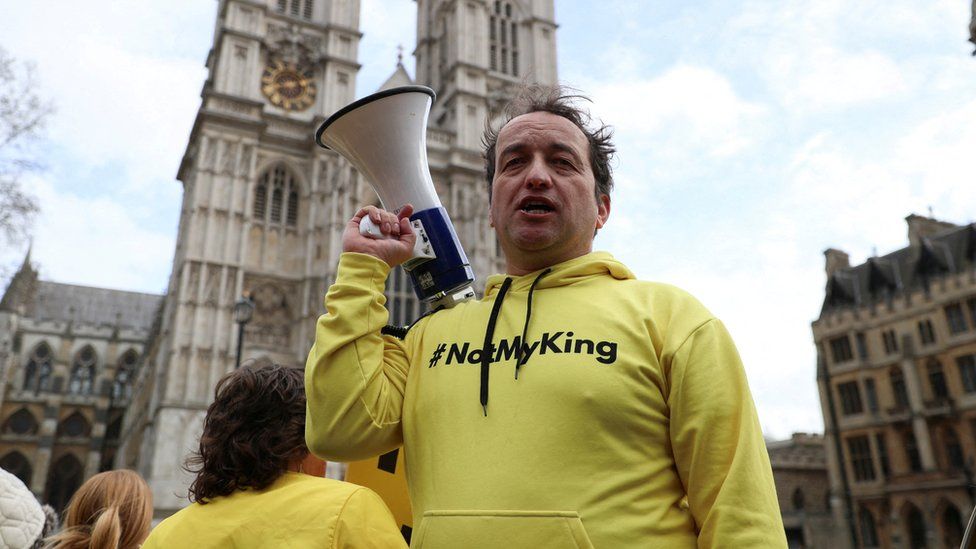 REUTERS
REUTERSNew legislation passed this week made it illegal to prepare to lock-on to things like street furniture.
The Metropolitan Police has not confirmed the exact number of people detained, but did say a number of arrests had been made near the Coronation parade route:
- several people have been detained on suspicion of breaching the peace on Carlton House Terrace, near St James' Park
- four have been held on suspicion of conspiracy to cause public nuisance in the area of St Martin's Lane, by Trafalgar Square, with lock-on devices seized
- three more held on suspicion of possessing articles to cause criminal damage near Wellington Arch.
On Wednesday, the force said they would have an "extremely low threshold" for protests during coronation celebrations, adding that demonstrators should expect "swift action".
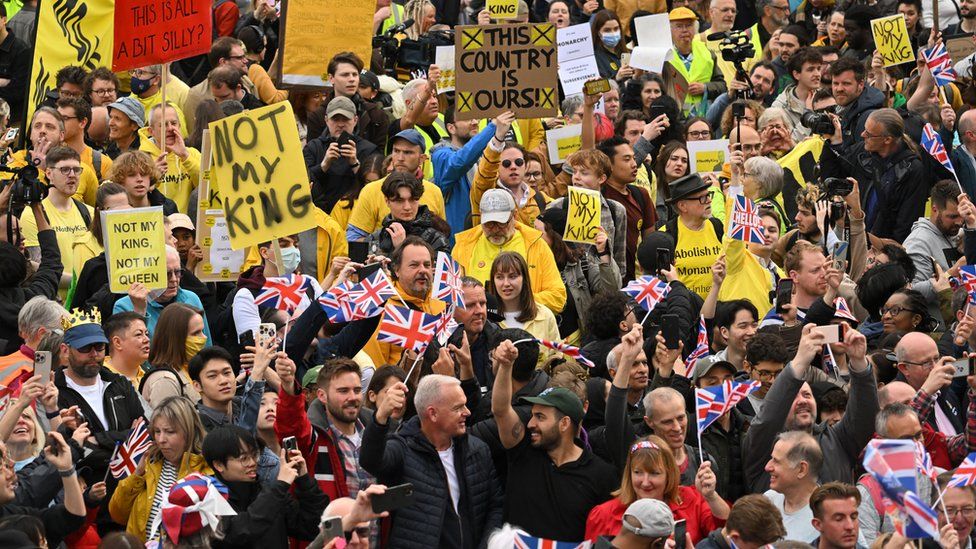 PA MEDIA
PA MEDIABut on Friday, Mr Smith said he had been speaking with the Met to organise the protest since January and he was not concerned he would be arrested, as the new laws would not apply to their plans.
He told BBC Radio Leeds that Republic "certainly have no intention of actually disrupting" the proceedings.
"We will be very visible, we will be loud, we will be hard to miss, but the procession and the plans for the coronation will go ahead uninterrupted by us".
Republic said on Saturday morning that hundreds of their placards had been seized and questioned: "Is this democracy?"
"Some ask why we're protesting. It's because we want to use the coronation to change the debate about the monarchy and show that we're not a nation of royalists," the campaign group wrote.
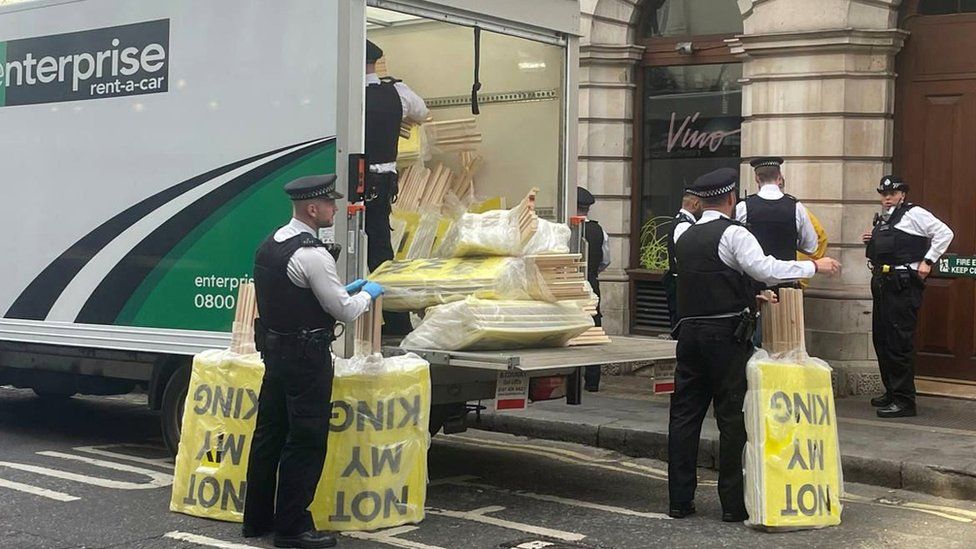 PA MEDIA
PA MEDIA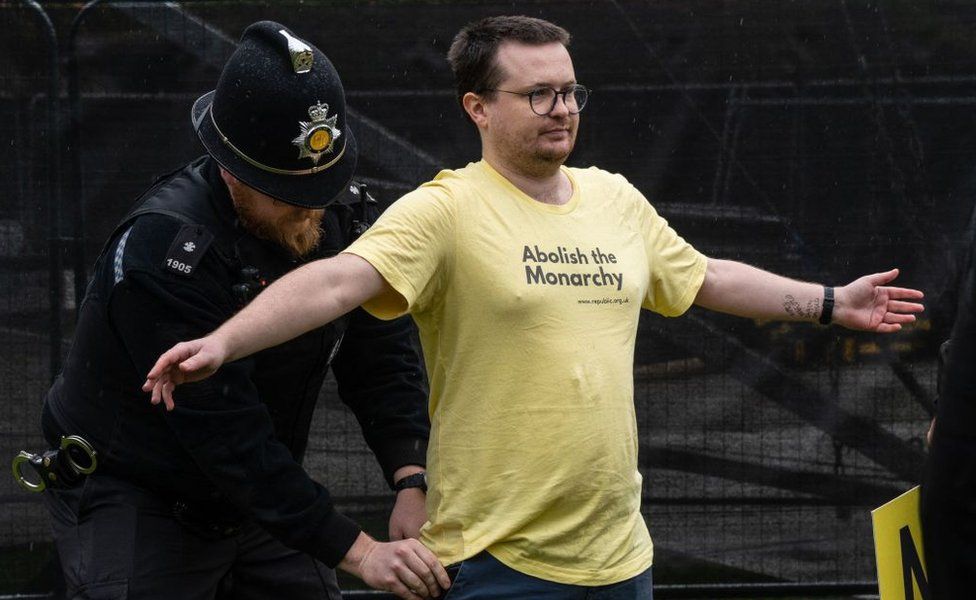 GETTY IMAGES
GETTY IMAGESThe anti-monarchy protest was organised near Trafalgar Square in central London, with crowds wearing yellow bursting into chants of "Not my King" and "Free Graham Smith".
Thousands of people gathered to watch the Coronation procession from Buckingham Palace to Westminster Abbey ahead of the ceremony.
During the Coronation ceremony, which was being broadcast in Trafalgar Square over loud speakers, hundreds of protesters booed the declarations of "God Save the King".
Around 300 people gathered for a protest organised by Republic Cymru in Cardiff City Centre.
In Scotland, supporters of Scottish independence chanted anti-monarchy slogans on a march in Glasgow city centre, while a separate rally is being held by the group Our Republic, which campaigns for an elected head of state.
 REUTERS
REUTERSAround 13 Just Stop Oil protesters have been been arrested on the Mall in London, with a large group from the climate change campaign group seen in handcuffs.
Just Stop Oil has said five demonstrators were also arrested at Downing Street.
A spokeswoman for the group said their plan was "only to display T-shirts and flags", adding: "This is a dystopian nightmare."
Non-profit campaign group Human Rights Watch said the arrests were "something you would expect to see in Moscow not London".
"The reports of people being arrested for peacefully protesting the coronation are incredibly alarming", its UK director Yasmine Ahmed said in a statement.
Shocking moment Just Stop Oil eco-protesters removed from The Mall during the coronation
Daily Mail
May 6, 2023 BUCKINGHAM PALACE
It estimated that some 11,000 police officers are in place to form a ring of steel around today's proceedings. The security effort's code name is Operation Golden Orb, and police snipers have already been spotted on the rooftop of Buckingham Palace. As well as that, tactical firearms units with Koch MP5 machine-guns and Glock 17 pistols will be on patrol. Armed response vehicles are also said to be on standby. It is even expected that senior police officers will use facial recognition technology for the first time ever to identify potential suspects in the crowds. Much of the security work leading up to today's major event - which is the biggest ceremony staged in the British capital for 70 years - has been done in the prior weeks.
06/05/2023
London police have been accused of stifling free speech after they arrested more than a dozen environmental activists and six anti-monarchy protesters ahead of the coronation procession in central London on Saturday.
Police detained at least 19 environmentalists as they shouted messages about climate change. Some were wearing T-shirts reading 'Just stop oil'.
Anti-monarchy group Republic said several of its members were stopped near Trafalgar Square and led to police vans.
Hundreds of the yellow "Not my King" signs were also seized, the organisation said with photos.
"This is something you would expect to see in Moscow, not in London," Human Rights Watch said.
The police confirmed that they had made several arrests on suspicion of disturbing the peace in several places.










